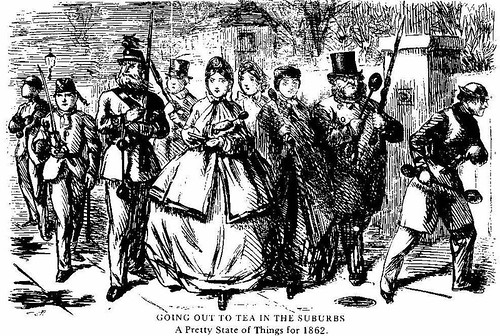The more things change ...
I was taken with this cartoon in the Winter edition of The Historian (from the Historical Association.)
It reads: "Going out to tea in the suburbs. A Pretty State of Things for 1862. (From Punch's Almanack 1863.)
Update the wardrobe, and it would look perfectly at home in The Daily Mail, or the Telegraph or Times today.
The article that it illustrates is "Who's afraid of the Victorian underworld?" by Andy Croll, which looks at 40 years of historiography on the topic, which first swallowed uncritically the Victorians' own accounts of complex underground networks: "historians showed how Merthyr Tydfil, a booming Welsh iron town, possessed its very own criminal class. The 'China' district ... was replete with its own leaders ('Emperors' and 'Empresses'), kidsmen (real-life Fagans, bullies, Rodnies (juvenile offenders) and numerous 'nymphs of the pave' (prostitutes). (p. 30)
Then the view increasingly arose that those 'criminals' before the courts presented as dedicated thieves, garotters etc were simply members of the urban poor who stole when need and opportunity arose (p. 32)
Finally the approach developed that Victorian middle-class accounts told us about middle-class attitudes, but nothing more.
But now some works are trying to critically recover some "genuine" working-class material from the middle-class work. (It cites approvingly Heather Shore's Artful Dodgers: Youth and Crime in Early Nineteenth-Century London, 1999.
It seems the perfect model of a classic academic pattern, or indeed a political one. Funny how those positions look familiar - you could again find them in today's papers, matched to their varying political hues.
And lest we should feel in any way superior to those crinolined Victorians, there's a vampire panic raging in Birmingham now. (Pace London's garotting scare of 1862).
Although I'm not sure if any Victorian "criminal" was quite this politically sophisticated. As a metaphor for America's impact on the world on this inauguration day it could hardly be bettered.








0 Comments:
Post a Comment
<< Home